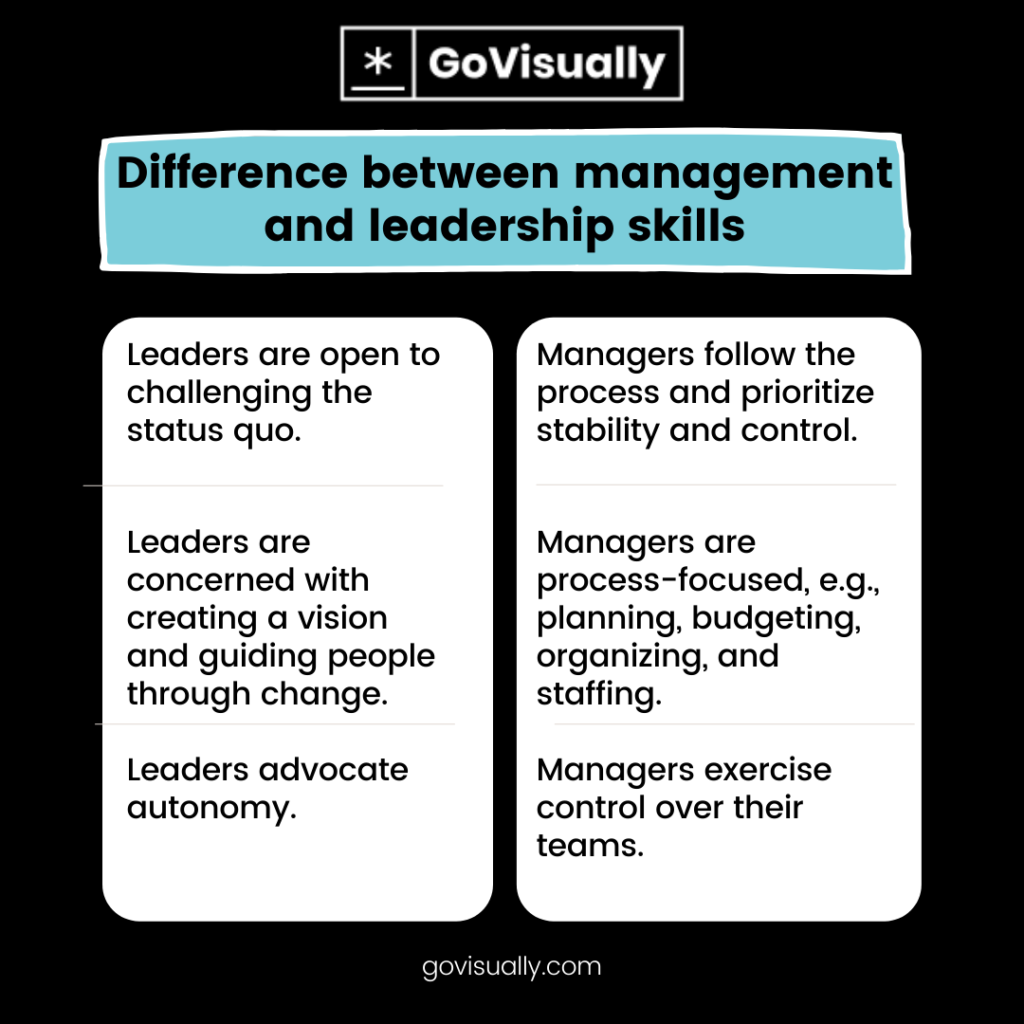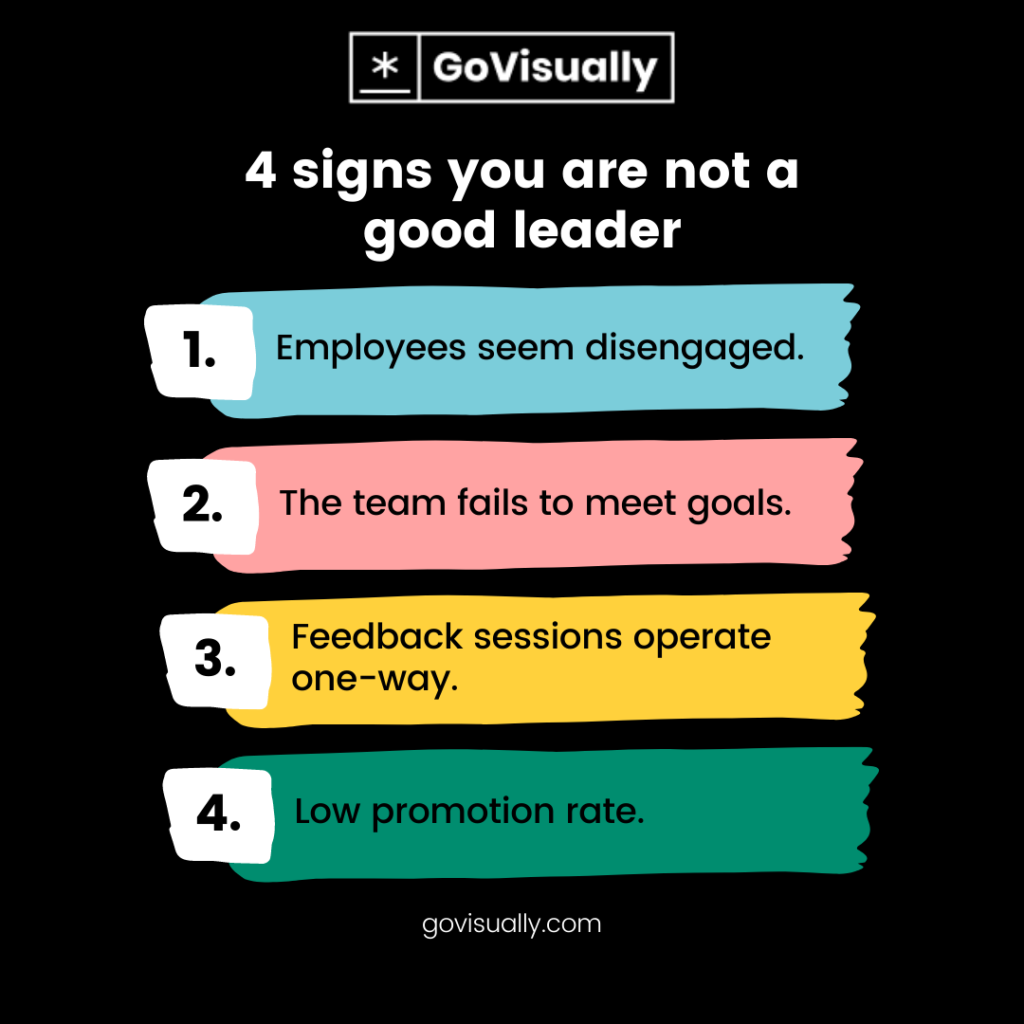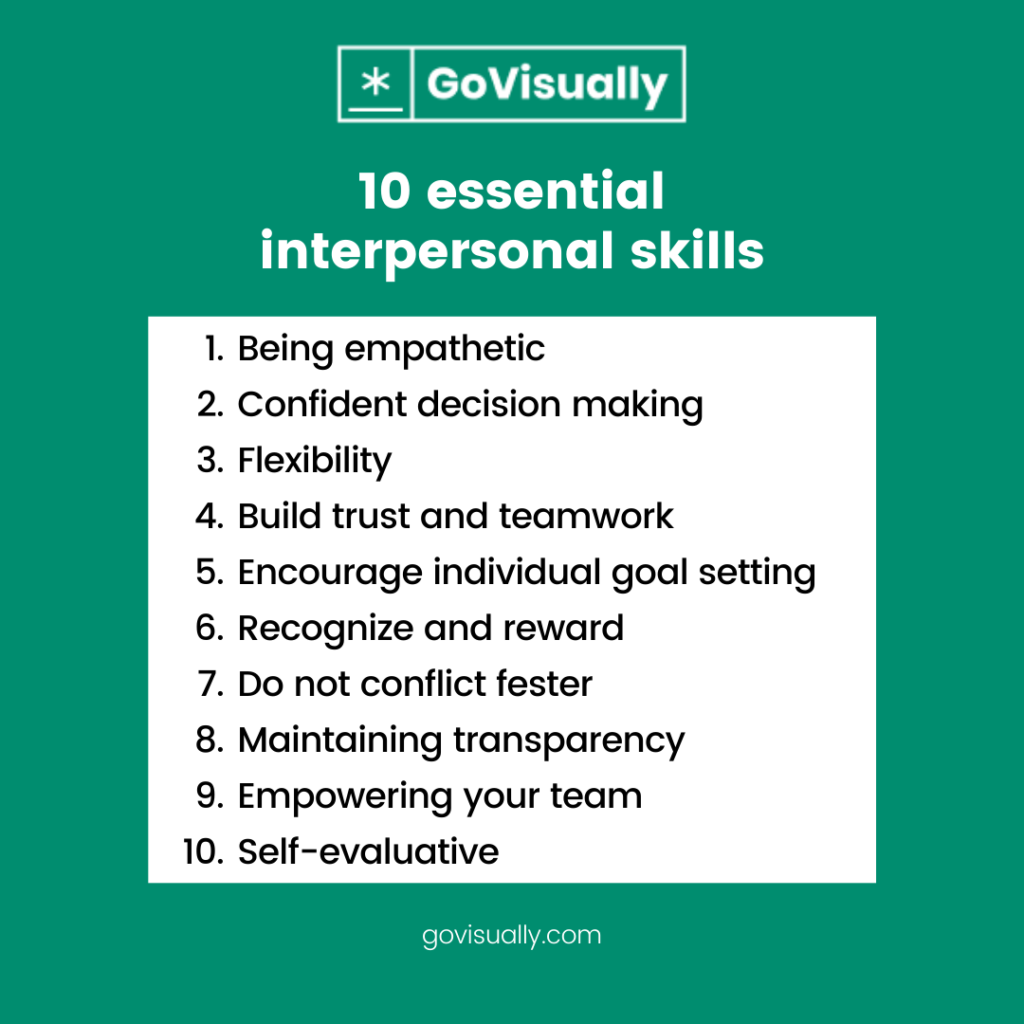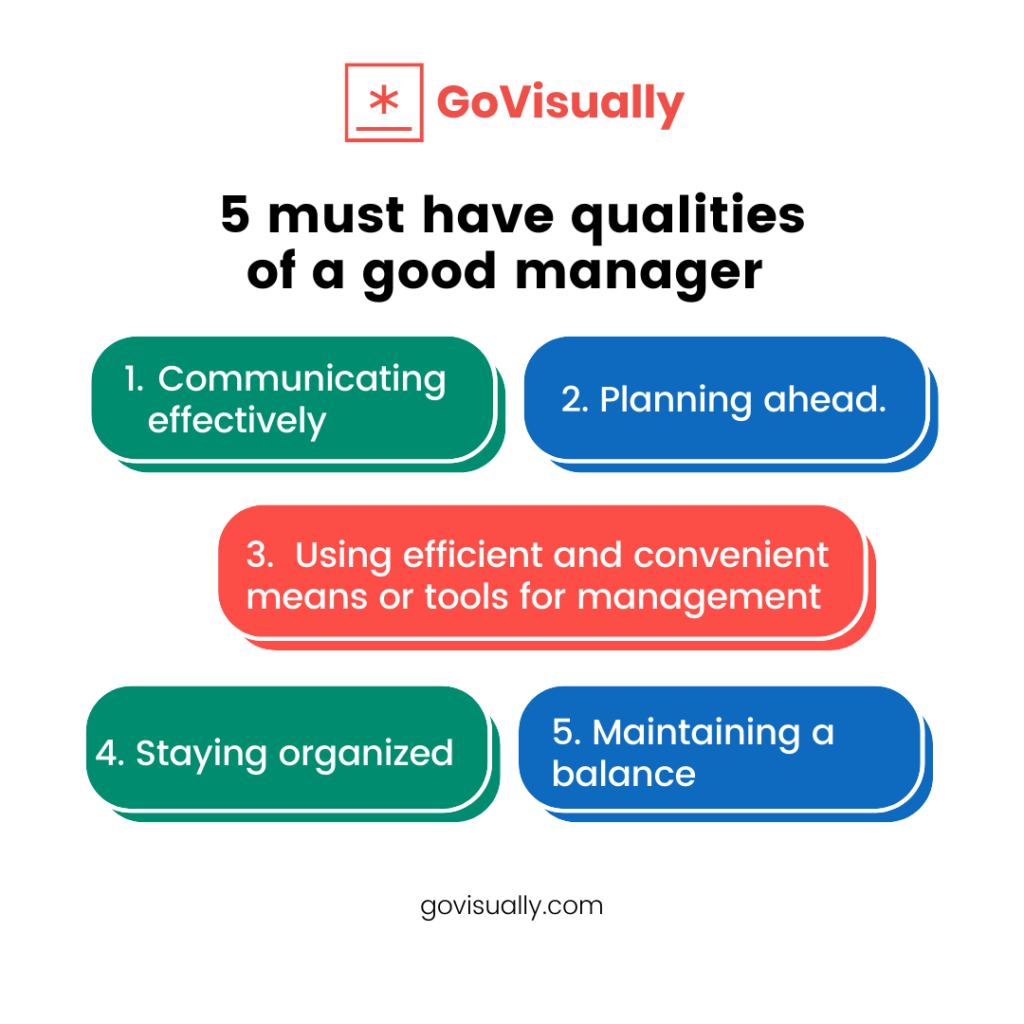A successful business depends on exceptional teamwork. And exceptional teamwork depends on great managers. So what makes a good manager?
Is there something inherent about being a remarkable manager or can anyone become one with some effort in the right direction?
There must be more questions plaguing your mind after that long-awaited promotion, that vacant position that haunts you every day while trying to hire a manager, or simply the curiosity and desire to improve as a manager yourself.
Rest assured, you’ve found a definitive one-stop guide with answers to all your questions!
From outlining the skills a manager needs and the signs you’re not showing your true potential as a manager – to the journey through management and leadership, there’s a lot in store for you.
So let’s begin!
Cut design & video review time in half
Try GoVisually free today!
Table of Contents
What makes a good manager? – the characteristics
For a man to carve a boat, he must know what a boat is.
In simpler words, to become a good manager you must learn what it means to be one and what qualities are needed to identify as one. A wide range of managerial roles and several unique management and leadership styles could apply to any workplace scenario.
No matter which role you’re assigned or which style you resonate with, there are some foundational skills you must strive to develop to become a successful manager. All of which are entirely related to two notions: management and leadership.
But before that, I would like to extend more on how being just a manager and being a leader is different and why you should incorporate skills necessary for both in your role.
The difference between what makes a good manager and a good leader
When we talk about managers and leaders, what normally comes to mind is often the misconception that they’re the same thing. Although the terms can be used interchangeably, the functions an individual performs behind both words are different.
Effectively managing an organization is mostly interpreted as only managing its structures and processes. However, there’s arguably another crucial aspect of management that is often overlooked. That is more concerned with bringing vision, inspiration, and acknowledging a more human side of things.
A good manager knows how to effectively manage their team, and effective management requires a balance in both management and leadership skills.
Here are some of the key differences between management and leadership skills.
- Managers follow the process and prioritize stability and control. Leaders are open to challenging the status quo and tend to be more patient with a lack of structure.
- Managers are process-focused, e.g., planning, budgeting, organizing, and staffing. Leaders are concerned with creating a vision, motivating, and guiding people through change.
- Managers exercise control over their teams to deliver the desired results. Leaders advocate autonomy so that the team members are self-motivated to achieve the set goal.

It is important to understand that there is no way one approach is better than the other. However, it could be said that many organizations today are over-managed and under-led. So as a matter of fact, what makes a successful manager isn’t simply management, but a combination of both management and leadership.
Signs you are not a good leader
There’s always room for improvement, though some managers may need more time to thrive than others, it’s always better to know what you might be doing wrong so you can improve. If you only focus on your managerial roles and ignore the signs arising from a lack of good leadership you might find yourself some trouble later on.
Signs that you’re not being an effective leader include.

Employees seem disengaged
If your team is simply going through the days, completing their assigned tasks, and nothing more, you may have a disengaged team on your hands. This signifies that you’re not properly inspiring or enabling them to achieve their true potential.
The team fails to meet goals
It’s normal not to meet all of the plans, but it is a problem when it happens consistently. This could be a sign that you need to change the way you communicate with your team and help them overcome whatever might be the cause.
Feedback sessions operate one-way
Effective managers encourage their teams to share opinions and ideas. If your team holds back during feedback sessions, they might not feel comfortable speaking up in front of you. This can hinder your team’s ability to solve business problems in a more productive way.
Low promotion rate
Great leaders help their team members develop their skills and build career paths by sponsoring them for promotions when the time is right. If your team has a low promotion rate or a high employee turnover rate due to a lack of career progression, you may need to work on employee development and engagement.
If you see any of these signs in your current work setting, it means you need to change your management style to integrate more traits of a leader. So let’s move over to the solutions.
What makes a good manager and leader? – 10 essential interpersonal skills
Great managers are also great leaders. One of the quotes about being a leader goes something like this;

This is also true for becoming a manager. Especially in today’s time where enterprises run less on hierarchies and more on cooperation. A good manager is one that knows how to work with the team not above them.
These 10 soft skills are a must-have if you’re aiming to become a manager every employee remembers as the best of their career highlight.

1. Being empathetic
Having emotional intelligence and the empathy to identify factors like burnout, anxiety, and disengagement in your employees, which could be contributing to their declining performance makes all the difference between a motivated and dissatisfied employee.
Good managers can find and eliminate red flags before the employee could face a complete burnout.
2. Flexibility
This one comes in line with being sensitive to change and accepting it. Businesses, people, lifestyles, and everything is bound to evolve with time. Being resistant to change is highly unproductive and inefficient. Great leaders are innovative and open to change.
3. Confident decision making
Managers are prone to the unproductive cycle of analysis-paralysis. Overthinking decisions and hesitating to make them are traits unfit for a manager. Managers need to make decisions using a structured, logical, and level-headed approach for the benefit of their team and company.
4. Building trust and teamwork
If your employees feel scared to come up to you and ask for help, you’re failing at being a manager miserably. It is extremely important and necessary to build trust with your team.
Once your team members realize that they can rely on you they will be more comfortable following your lead, which would also encourage better teamwork under your lead.
5. Encourage individual goal-setting
The recent and much-needed initiative at the workplace is encouraging employees to make their own goals. Doing so would result in employees having greater autonomy over their work and improved performance on tasks. Managers, while taking the back seat in the goal-setting process, still play a substantial role in motivating, guiding, and aligning their team goals with organizational objectives.
6. Recognise and reward
Good leadership and management have appreciation and encouragement at their foundation. Managers have to be more perceptive in this field and provide their team with the recognition and rewards they deserve. This will also help with employee retainment and boost team morale.
7. Do not let conflict fester
Conflicts at the workplace are a common occurrence, whether it’s due to personality clashes or personal feuds. Avoiding conflicts and letting them grow can lead a team to its demise.
Good managers keep an eye out for any incivility, bullying, or any other matters leading to conflict and make sure to effectively deal with them on time.
8. Maintaining transparency
Your team and employees would want to know things going on in the organization, they need to feel valued and connected.
Direct and honest feedback, discussions on prospective organizational goals, and sharing information about how they are contributing to overall performance are traits all great leaders have. It improves employee engagement and gives your employees a sense of belonging.
9. Empowering your team
A good manager tries their best to relate with every employee and team member so they can understand what motivates them the most. Everyone feels empowered through different means, it can be as incentives or recognition.
Regardless of the method being used, a motivated team is important for successful task completion and effective project management.
10. Self-evaluative
The most significant skill out of all is having the ability to self-reflect, evaluate and improve. A good manager and a great leader willingly seek their flaws and make efforts to correct them so they can become better versions of themselves, only then can they help their team become a better version of theirs.
If you’re here reading this list, you’re already one step closer to being the best manager your organization can have. So keep that up and make sure to take notes because next up are the imperative skills good managers must have!
Must have qualities of a good manager – things you can’t overlook
Developing essential soft skills pave the path toward becoming a great manager, but there are some definite characteristics a manager must have to ensure productivity is maintained and results are derived.
In line with the five principles of great management, there are five things that can not be overlooked for effective management.

1. Communicating effectively
Effectively communicating with your staff is a crucial aspect of management. Not being able to do so often results in team breakdowns, losing projects and workplace conflicts. A good manager knows their way through communicating with ease and delivering what has to be delivered without falling into the pit called micro-managing.
There are infinite reasons why good communication skills are important for career growth and a result-oriented workflow, and endless benefits of good communication in the workplace. This means all managers should give priority to being expert communicators before anything else.
2. Planning ahead
Great managers don’t play checkers; they play chess. In the renowned article on what great managers do, this analogy explains everything that has to be explained when talking about how managers should plan their every step for the better.
As they say, with great power comes great responsibility. Some of the most excellent cases of effective management have exceptional planning and evaluation skills at the core. What truly makes a manager great is how good they are at keeping things in check and using opportunities as they arise.
3. Staying organized
When you’re a manager, there’s always too much to do and too little time. A good manager knows how to stay organized to stay on top of the game. This includes staying organized personally and throughout communicating, planning, implementing, and concluding projects so important details are never left out.
Leveraging business process management tools is the most effective and hassle-free way of staying organized in the current business scene. They help you keep track of progress, suggest changes and keep a tab on everything from start to finish in the best ways possible.
4. Using efficient and convenient means or tools for management
For a good manager, it’s always a hunt for efficient modes of communication and software to assist project management, planning, and organization. Making use of technology, and evolving your strategies with the forever evolving digital landscape is an ideal trait of a flexible, result-oriented, and innovative manager.
Creative project management and review tools like GoVisually are real-time platforms to collaborate and receive feedback in real-time. It can cut down your review time in half and promote a faster project turnaround.
5. Maintaining a balance
It might sound obvious, but it’s really not. The most important part of effectively managing your organization is remembering to maintain a balance. Whether it’s between your lifestyle, work habits, leadership style, or communication.
Knowing where to step back, take a deep breath and take it easy is just as significant as generating results, encouraging progress, and being the best at your job. The art of knowing is knowing what to avoid, so avoid getting burnout from chasing productivity all the time.
The bottom line
Becoming a good manager and leader is nothing impossible when there’s an effort for improvement in the right direction. For a very long time, people believed that great leaders can only be born, not made. But with experience, we’ve all found that to be untrue.
We hope that these tips help you realize what makes a good manager and help you become one. Do share your experience with us. We’d love to hear more about your managerial process.
Want to send big files?

Need a quick way to share large files and creative assets?
With GoVisually Share, it’s absolutely free! Try today.




